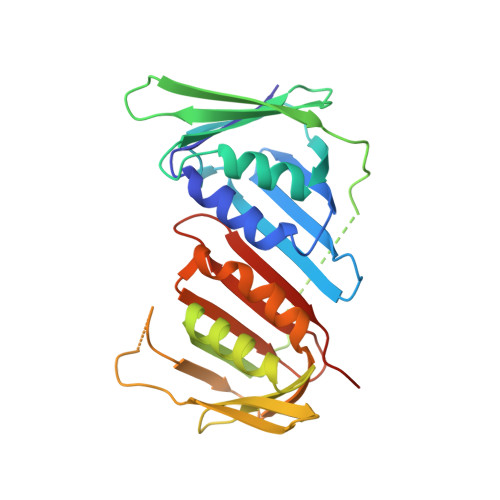A thermosensitive PCNA allele underlies an ataxia-telangiectasia-like disorder.
Magrino, J., Munford, V., Martins, D.J., Homma, T.K., Page, B., Gaubitz, C., Freire, B.L., Lerario, A.M., Vilar, J.B., Amorin, A., Leao, E.K.E., Kok, F., Menck, C.F., Jorge, A.A., Kelch, B.A.(2023) J Biological Chem 299: 104656-104656
- PubMed: 36990216
- DOI: https://doi.org/10.1016/j.jbc.2023.104656
- Primary Citation of Related Structures:
8E84 - PubMed Abstract:
Proliferating cell nuclear antigen (PCNA) is a sliding clamp protein that coordinates DNA replication with various DNA maintenance events that are critical for human health. Recently, a hypomorphic homozygous serine to isoleucine (S228I) substitution in PCNA was described to underlie a rare DNA repair disorder known as PCNA-associated DNA repair disorder (PARD). PARD symptoms range from UV sensitivity, neurodegeneration, telangiectasia, and premature aging. We, and others, previously showed that the S228I variant changes the protein-binding pocket of PCNA to a conformation that impairs interactions with specific partners. Here, we report a second PCNA substitution (C148S) that also causes PARD. Unlike PCNA-S228I, PCNA-C148S has WT-like structure and affinity toward partners. In contrast, both disease-associated variants possess a thermostability defect. Furthermore, patient-derived cells homozygous for the C148S allele exhibit low levels of chromatin-bound PCNA and display temperature-dependent phenotypes. The stability defect of both PARD variants indicates that PCNA levels are likely an important driver of PARD disease. These results significantly advance our understanding of PARD and will likely stimulate additional work focused on clinical, diagnostic, and therapeutic aspects of this severe disease.
- Department of Biochemistry and Biotechnology, University of Massachusetts Chan Medical School, Worcester, Massachusetts, USA.
Organizational Affiliation:
















